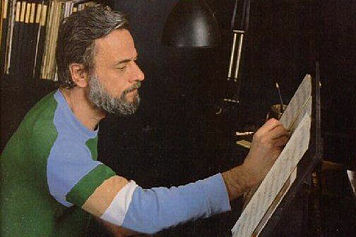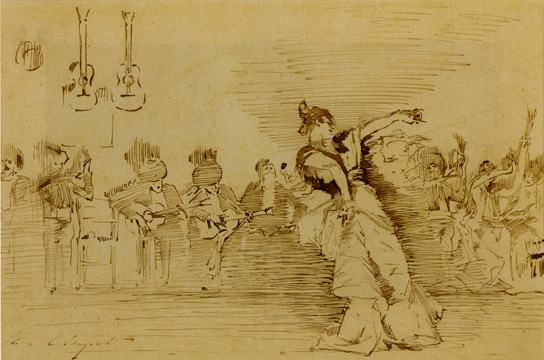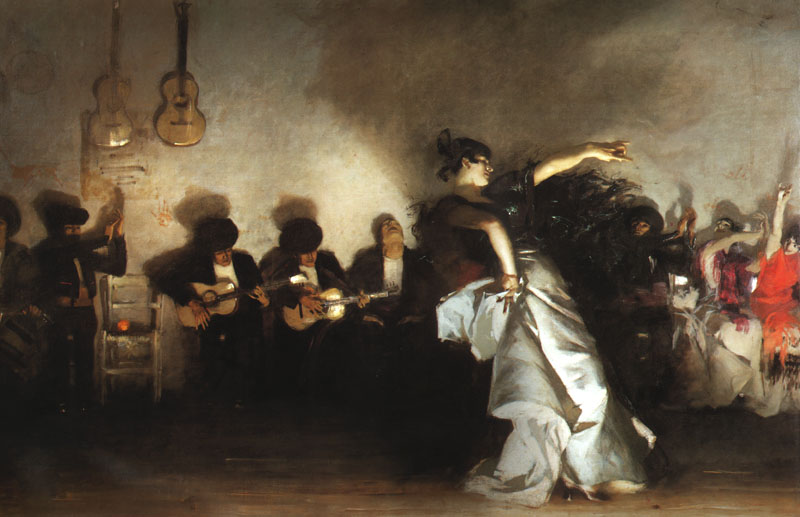“A turkey is more occult and awful than all the angels and archangels. In so far as God has partly revealed to us an angelic world, he has partly told us what an angel means. But God has never told us what a turkey means. And if you go and stare at a live turkey for an hour or two, you will find by the end of it that the enigma has rather increased than diminished.”
G.K. Chesterton, “Christmas” (in All Things Considered)
Archives for November 2008
TT: From their mouths
 A few months ago I wrote a “Sightings” column for The Wall Street Journal called “Hearing Is Believing” in which I took note of the release by the British Library of a series of CDs devoted to talks by and interviews with W.H. Auden, Graham Greene, George Bernard Shaw, Evelyn Waugh, and H.G. Wells that were originally broadcast over the BBC. Now comes a pair of three-disc samplers devoted to archival recordings of broadcasts by other writers, most of whom who didn’t make it into the studio often enough to fill up a full CD.
A few months ago I wrote a “Sightings” column for The Wall Street Journal called “Hearing Is Believing” in which I took note of the release by the British Library of a series of CDs devoted to talks by and interviews with W.H. Auden, Graham Greene, George Bernard Shaw, Evelyn Waugh, and H.G. Wells that were originally broadcast over the BBC. Now comes a pair of three-disc samplers devoted to archival recordings of broadcasts by other writers, most of whom who didn’t make it into the studio often enough to fill up a full CD.
The Spoken Word: American Writers contains recordings by James Baldwin, Saul Bellow, Pearl Buck, William S. Burroughs, Raymond Chandler, Ralph Ellison, F. Scott Fitzgerald, Lillian Hellman, Patricia Highsmith, Sinclair Lewis, Anita Loos, Mary McCarthy, James Michener, Arthur Miller, Henry Miller, Toni Morrison, Vladimir Nabokov, Eugene O’Neill, Isaac Bashevis Singer, Gertrude Stein, John Steinbeck, William Styron, James Thurber, Gore Vidal, Eudora Welty, Tennessee Williams, and Thornton Wilder.
The Spoken Word: British Writers contains recordings by J.G. Ballard, Algernon Blackwood, Anthony Burgess, John le Carré, G.K. Chesterton, Arthur Conan Doyle, Noël Coward, Ian Fleming, E.M. Forster, William Golding, Graham Greene, Aldous Huxley, Rudyard Kipling, Doris Lessing, Arthur Machen (who he?), Somerset Maugham, Daphne du Maurier, Nancy Mitford, the Baroness Orczy (she wrote The Scarlet Pimpernel), Joe Orton, Harold Pinter, J.B. Priestley, C.P. Snow, Muriel Spark, J.R.R. Tolkien, Evelyn Waugh, Rebecca West, Angus Wilson, P.G. Wodehouse, and Virginia Woolf.
Two questions:
(1) Where the hell is Max Beerbohm?
(2) What are you waiting for? Place your order!
* * *
Incidentally, iTunes offers downloads of some interesting spoken-word recordings by famous writers of the past:
• For Kingsley Amis, search for “A Song of Experience/Nocturne.”
• For John Betjeman, search for “The Church’s Restoration/The Olympic Girl.”
• For G.K. Chesterton, Arthur Conan Doyle, Leo Tolstoy, and W.B. Yeats, search for “The Very Best Historic Voices.” (This album also contains a counterfeit recording that purports to be the voice of Oscar Wilde.)
• For T.S. Eliot, search for “The Love Song of J. Alfred Prufrock.”
• For Robert Frost, search for “Robert Frost Two Poems.”
• For Rudyard Kipling, search for “Reflections on War.”
• For Philip Larkin, search for “An Arundel Tomb/Mr. Bleaney.”
• For George Bernard Shaw, search for “Public Address on His Ninetieth Birthday.”
TT: Getting to know her
A reader writes:
You have written eloquently and movingly about Nancy LaMott, but I never really had a chance to hear her sing. Just now, sitting in my office, with Pandora Radio in the background, Johnny Mercer’s “When October Goes” came on. It was the most incredible singing I have ever heard. It absolutely blew me away. It’s as if her very soul was pouring out
through the song. Rare are the moments when you hear a song and you
just know that it can never–ever–be done any better. You should
remind your readers what a gift she was–and is.
My friend Nancy died thirteen years ago next month, but her voice is still with us, and I’m glad to see that people are still discovering it. That particular song is on Come Rain or Come Shine: The Songs of Johnny Mercer, my favorite of her albums. Give it to someone you love for Christmas.
TT: Under construction
The video and audio modules of the right-hand column have been sorely in need of updating for several months–many of the links have gone dead–so I have pulled them off the site in order to do the necessary work. This may take quite some time. Apologies in advance, and please be patient!
TT: Almanac
“Our family talked a lot at table, and only two subjects were taboo: politics and personal troubles. The first was sternly avoided because Father ran a nonpartisan daily in a small town, with some success, and did not wish to express his own opinions in public, even when in private.”
M.F.K. Fisher, Cook’s and Diner’s Dictionary
CD
Stephen Sondheim: The Story So Far (Sony Classics, four CDs). Eighty-two songs by the greatest musical-theater composer of the postwar era. All of Sondheim’s shows are represented, and the performances range from original-cast recordings to rare demos sung and played by the composer himself. Sondheim fanatics will already have the bulk of this material, but if you’re just getting to know him, The Story So Far is a good place to start (TT).
TT: No, but I heard the movie
Throughout the first few months of the writing of The Letter, I carried the bulk of the creative load, hammering out the first draft of the libretto and painstakingly revising it under the watchful eye of Paul Moravec, my musical collaborator. Now the ball is in Paul’s court: he’s orchestrating The Letter, a grueling task with which I have nothing to do beyond listening to a synthesized version of each scene on my iBook and commenting on the scoring.
Because I’m not only a writer but a musician with professional performing experience, I take for granted certain things about the making of an opera of which laymen know little or nothing. Hence it surprises me–or used to, anyway–that so few people outside the profession understand what it means to orchestrate a piece of classical music. To put it as succinctly as possible, The Letter was originally composed for voices and piano. What Paul is now doing is rewriting the piano part for a seventy-piece pit orchestra that consists of two flutes and a piccolo, two oboes and an English horn, two clarinets and a bass clarinet, two bassoons, a tenor saxophone, four French horns, three trumpets, three trombones, a harp, two percussionists, and a symphony-size string section.
 This is a back-breakingly complicated and labor-intensive task, one that Broadway and Hollywood composers normally “outsource” to well-paid specialists. Jonathan Tunick, for instance, orchestrates most of Stephen Sondheim’s musicals, while virtually all of the film scores of Max Steiner, who wrote the music for the 1940 film version of The Letter, were orchestrated by Hugo Friedhofer. (This undoubtedly explains why musical-comedy buffs are always asking me whether and/or why Paul is doing his own orchestrations.)
This is a back-breakingly complicated and labor-intensive task, one that Broadway and Hollywood composers normally “outsource” to well-paid specialists. Jonathan Tunick, for instance, orchestrates most of Stephen Sondheim’s musicals, while virtually all of the film scores of Max Steiner, who wrote the music for the 1940 film version of The Letter, were orchestrated by Hugo Friedhofer. (This undoubtedly explains why musical-comedy buffs are always asking me whether and/or why Paul is doing his own orchestrations.)
Even Leonard Bernstein used a pair of professional orchestrators for West Side Story, not because he couldn’t have scored the show himself–he was a superbly imaginative orchestrator in his own right–but because he simply didn’t have the time. As Humphrey Burton explained in his Bernstein biography:
Once the green light had been given, Bernstein had two main tasks; coaching the company in his music and supervising the orchestrations, which began in late June, with Sid Ramin and Irwin Kostal carrying out Bernstein’s wishes. Ramin was especially knowledgeable about jazz and vaudeville. He suggested some of the slapstick effects in “Officer Krupke.” Kostal had been a student of Stefan Wolpe: he did the music for the weekly Show of Shows starring Sid Caesar. He described Bernstein as a great orchestrator. “If he’d had the time he wouldn’t even need us….When it came to West Side Story every note is his: still, he would say once in a while, ‘Who said that orchestration can’t be creative?’ He was entirely appreciative of anything that we did. Jerome Robbins, if you changed anything, would really get angry. Lenny would say, ‘Jesus, why didn’t I think of that?'”
In opera, on the other hand, it’s taken for granted that the composer will orchestrate his own music. Orchestration is a creative process, not a mechanical chore. The difference between a two-line piano part and a full orchestral score is analogous to the difference between a finished painting and the preliminary black-and-white sketches on which it is based. The sketches may be works of art in their own right, but no real artist would think for a moment of farming out the task of turning them into a large-scale canvas, any more than a serious novelist would outline the plot of a book, then let his secretary write the dialogue.
 Take a familiar painting like John Singer Sargent’s “El Jaleo,” the huge and spectacular 1882 portrait of a flamenco dancer in action that hangs in the Isabella Stewart Gardner Museum in Boston. It’s one of Sargent’s most celebrated paintings, and deservedly so. But “El Jaleo” isn’t just “about” its subject matter and composition, memorable as they are: it’s also about the startlingly vivid colors that Sargent used to bring that composition to life.
Take a familiar painting like John Singer Sargent’s “El Jaleo,” the huge and spectacular 1882 portrait of a flamenco dancer in action that hangs in the Isabella Stewart Gardner Museum in Boston. It’s one of Sargent’s most celebrated paintings, and deservedly so. But “El Jaleo” isn’t just “about” its subject matter and composition, memorable as they are: it’s also about the startlingly vivid colors that Sargent used to bring that composition to life.
 If somebody else had chosen those colors and applied them to the canvas, even after talking at length to Sargent about what the artist had in mind, then the final painting wouldn’t be a fully authentic Sargent but a collaboration between John Singer Sargent and Mr. Somebody Else, and my guess is that we would think less of it for that reason.
If somebody else had chosen those colors and applied them to the canvas, even after talking at length to Sargent about what the artist had in mind, then the final painting wouldn’t be a fully authentic Sargent but a collaboration between John Singer Sargent and Mr. Somebody Else, and my guess is that we would think less of it for that reason.
The same is true in opera. Think of a well-known aria like, say, “Che gelida manina” from Puccini’s La Bohème. Remember how it starts? Your little hand is frozen, Rodolfo says to Mimi. Let me warm it for you. Then, against a simple background of softly murmuring strings, you hear the crisp, icy ping of a harp, and all at once you feel a chill in the air. That’s what musicians call “tone painting,” and it’s as crucial to the effect of the aria as the gentle tune that Rodolfo sings. If Puccini had chosen instead to score the first few pages of “Che gelida manina” for mandolin and clarinets…well, you get the idea.
Needless to say, Paul is well aware of the extent to which the scoring of The Letter will contribute to the effect that it makes in the opera house. Like me, he is also a film buff, and he’s no less aware of the huge contribution made by film composers and their orchestrators to the dramatic impact of the classic movies of the Thirties and Forties. “Is this fun for you at all, or just work?” I asked him via e-mail last week. This was his reply:
It would be more fun if there weren’t so MUCH to get through–very time-consuming, but periods of enjoyment. I have learned from movie scores that timbre is to a remarkable degree the name of the game in setting the mood subliminally for the listener.
Of course I’m relying on my experience with the medium of opera principally for orchestration as with other matters, not film music. It’s an opera, after all. But the connection between the two is endlessly fascinating: movies were the operas of the twentieth century (and probably still are today) and people like Max Steiner & Co. would have been opera composers had they lived a hundred years earlier. Many of those guys were latter-day Wagnerians, and film was where the action was.
As a 20th, now 21st-century American, I have been naturally exposed to as much film music as opera music–probably more, in fact–so I am naturally drawing some on my movie experience. One could follow the ancestry of this particular opera score from opera through film through to opera again. In following the trajectory of Steiner & Co. in reverse to some extent, my modus operandi moves into the present and future of something else.
It stands to reason that both of us should often find ourselves using film-derived metaphors when talking about The Letter. As I wrote in this space two months ago:
Up to now I’ve only heard The Letter accompanied by a piano, and the difference is staggering. To hear the opening pages of our not-so-little opera reconceived in orchestral terms is like seeing a black-and-white movie reshot in Technicolor and CinemaScope.
I only wish I could share the experience with you! I’m proud of my contribution to The Letter, but I know more than enough about music to appreciate the infinitely greater complexity of the task in which Paul is now immersed, and it humbles me to think of what he’s putting himself through in order to bring our opera to the stage.
UPDATE: A friend writes:
A two-sentence bio of two men: “Jerome Robbins, if you changed anything, would really get angry. Lenny would say, ‘Jesus, why didn’t I think of that?'”
Right on both counts.
TT: In case you didn’t notice…
…the right-hand column is full of new stuff. Take a gander, won’t you?
